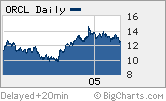 |
| Shares of Oracle have struggled so far this year...and the Street wasn't thrilled with the company's latest results. |
|
|
|
|
|
NEW YORK (CNN/Money) -
Oracle chief executive officer Larry Ellison had several reasons to celebrate on Tuesday -- or so he must have thought.
First, his company beat out top software rival SAP (Research) in a bidding war for retail software developer Retek. Oracle wound up acquiring Retek for about $11.25 a share.
Then, after the closing bell, Oracle reported fiscal third quarter sales and earnings, excluding charges, that were slightly ahead of analysts' expectations. The company also raised earnings guidance for its full fiscal year.
But Wall Street wasn't impressed.
Shares of Oracle (Research) fell slightly in after-hours trading following a 1.3 percent dip in regular trading on the Nasdaq. The lackluster response to Oracle's results doesn't bode well for other software vendors on Wednesday.
Oracle's earnings are significant not just because it is one of the larger software companies but because it is the first of the major software firms to report results. So its numbers provide a sneak peek as to what to expect from other software developers when they report first quarter results in April.
As such, shares of Oracle competitors IBM (Research), Siebel Systems (Research) and BEA Systems (Research) all slipped in after-hours trading. But Oracle, whose shares have tumbled nearly 10 percent this year, is facing some unique problems.
More deals?
Even though Oracle and many other software companies are seeking to juice their growth prospects through mergers, there have been some fears lately that Oracle may be biting off more than it can chew on the acquisition front.
In addition to Retek (Research), Oracle recently closed its purchase of PeopleSoft, which it fought for 18 months to acquire. And PeopleSoft is still in the process of integrating a merger of its own, 2003's purchase of J.D. Edwards -- the deal that sparked Oracle to bid for PeopleSoft in the first place.
Jason Brueschke, an analyst with Pacific Growth Equities, said that investors have reason to believe that Oracle is looking to do more deals in the near future.
The company disclosed in a separate filing with the Securities and Exchange Commission Tuesday that it was taking out a one-year credit facility with several banks worth $3 billion. "This suggests a sizable acquisition," Brueschke said.
But during a conference call with analysts, Ellison said that Oracle would prefer to not do any more major deals soon. He added though that it could easily deal with more purchases of company's of Retek's size. Oracle is buying Retek for just $670 million, compared to a more than $10 billion price tag for PeopleSoft.
How strong is demand?
Brueschke said that investors were also probably not happy to see sales of new software licenses coming in at $947 million, a bit below expectations.
Although Oracle generates only about a third of its revenue from new license sales (the remainder comes from license updates and services), Wall Street focuses closely on the new license figures since it gives the best indication of current demand.
Concerns about Oracle's long-term prospects also surfaced after former chief financial officer Harry You left last week to become the CEO of consulting firm BearingPoint (Research). He had only been with Oracle for eight months.
During the call, Oracle co-president and interim chief financial officer Safra Catz downplayed concerns (and quoted "The Godfather" in the process). "It's quite simple," she said. "Harry received an offer he couldn't refuse."
Wall Street may also be worried about the fact that Oracle's organic sales growth, which does not include the impact of acquisitions and currency fluctuations, wasn't extraordinary.
Oracle reported total sales growth of 23 percent for the quarter but this included about two months' worth of sales from PeopleSoft. Excluding PeopleSoft, revenues increased 18 percent.
Oracle, like many other U.S.-based multinationals, also continues to benefit from the weaker dollar, which boosts the value of sales generated overseas. After factoring out the effect of favorable exchange rates, Oracle's sales were up just 14 percent from a year ago. During the call, Catz said that total revenues may be boosted by 6 percent in the fourth quarter because of the weaker dollar.
Still, Ellison sought to reassure investors during the call, citing data which showed that, contrary to some fears, Oracle is gaining market share from rivals like IBM and Microsoft in its core business of database software, which accounted for nearly 85 percent of new license sales in the quarter.
For more about software mergers, click here.
For a look at software stocks, click here.

|